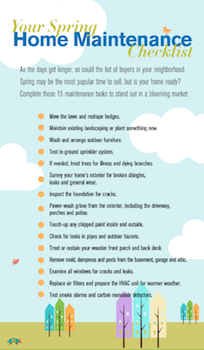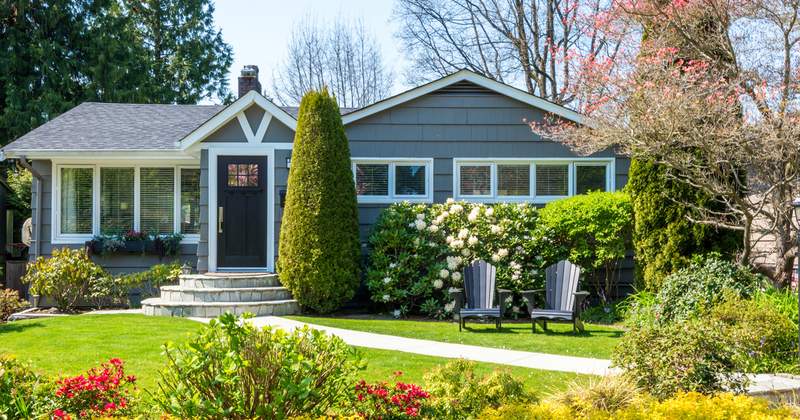Special Note Regarding COVID-19

| Hello,
Your health and safety are important to me. That’s why I’m reaching out to let you know that we’re doing what we can to provide the best service possible during this time, and that means being here for you. Please reach out with any questions that you may have, or if I can be helpful in any way. We will get through this together. If you want to keep up to date on COVID-19, visit the CDC’s website. Stay well, |
|
|
Beth Lugar Lugar Real Estate Team at CENTURY 21 Scheetz | 4929 E. 96th Street | Indianapolis, IN 46240 USA
|
Your Spring Home Maintenance Checklist

It’s no secret that springtime can breathe new life into a home. And in many markets, spring is the most popular time to buy or sell. Freshly manicured lawns and immaculate interiors add a certain appeal that may not be there during other seasons.
A property that’s in excellent condition is sure to catch the eye of a buyer. Even if your home isn’t currently on the market, it’s a good idea to make a habit of regular upkeep.
Ready to tackle your home maintenance tasks? Here’s your spring to-do list.
4 Tips for Decorating a Small Space


Whether it’s a cramped bedroom or an office nook, many homes have a small room that’s difficult to decorate.
Do you wish you could add more charm without forgoing square footage? Well, just because your space is limited, it doesn’t mean your style has to be.
Make your tiny area more usable and trendy with these four tips.
1. Create a focal point. Designing without a focal point can make your space look cluttered. Instead, arrange a single, standout feature at the center of the room. Organize a gallery wall with several of your favorite photos or hang one attention-grabbing piece of art.
2. Take decor to the top. If your home lacks high ceilings, use tall floor lamps and curtains to elongate your walls. You can further give the illusion of height by installing vertical shelves closer to the ceiling instead of at eye level.
3. Make it bright. Bring in natural light by hanging sheer window curtains. You can also add a mirror to the wall opposite a window to reflect light.
But if your small space doesn’t have windows, consider these ideas to illuminate it:
- Overhead lighting, such as bright bulbs in ceiling fixtures.
- Diffused lighting, like opaque glass or shaded floor lamps.
- Task lighting, including desk or reading lights.
Arrange multiple levels of lighting so your gaze moves to various areas of the space, which can make it feel larger.
4. Add decorative storage. When a room is full of stuff, it tends to feel smaller. Use your walls for storage by installing hooks or racks to give your items a rightful place.
If you want more space-saving ideas — or if you’re ready to start looking for a larger home — reach out today.
Annual Home Maintenance Checklist


sell when the time comes.
While this list is comprehensive, it’s not a complete list of all the things your home needs.
Monthly
- Change HVAC or furnace filters. If your family is small and pet-free, simply inspect the filter and replace it every 2-3 months.
- Clean range hood filters. Mix a degreaser with hot water, let it soak, then rinse it off.
- Check water softener. Check the salt level, add some if needed, and read the display to make sure no error codes are displayed. You’ll usually only add salt a few times a year.
Biannually
- Deep clean. Roll up your sleeves and deep clean appliances, windows, lighting, and every crevice and corner. Keeping a clean home and not letting dirt build-up will help keep it polished.
- Test the pressure relief valve on the water heater. This prevents corrosion—protecting leaks and helping it run efficiently.
- Replace batteries in smoke/carbon dioxide detectors. Make it a habit to change batteries every time you set the clocks for daylight savings time.
- Vacuum refrigerator coils. The fridge can account for up to 15 percent of your home’s total power—keep it running efficiently.
Annually Organized by Season
Spring – There’s a reason it’s called “Spring Cleaning”
- Service central air. Do this before it gets hot and you can often get this done at a discounted rate with enough time to spare before it gets sweltering hot.
- Check gutters and drainage. When April showers start coming down, will the water flow away from your house? Keep gutters clear so the water can flow where it’s supposed to.
- Test sump pump. You don’t want to wait until you need it to find out it’s not working!
- Check grout in the bathroom and kitchen. Fix the grout where needed—This will extend the life of tiled surfaces and keep them looking new.
- Check windows and screens. Clean window wells of fall and winter debris.
Summer – Shift your focus to the outdoors and enjoy the sunshine
- Clean ducts, sweep the chimney and get heating systems ready. You’ll be turning these on at the first hint of crisp fall weather, so do this now.
- Check and clean the clothes dryer vent. While running, check the exhaust for the smell of fresh laundry. If the exhaust is marginal, check for blockages. Also, vacuum the lint from the dryer hose.
- Clean garage. The garage is easy to ignore, get out there while the weather is nice, and check garage door sensors are working while you’re in there.
Fall – prepare for winter during this in-between season
- Winterize A/C systems. Store window units, and if you have central air, cover the outside unit with a tarp and fasten with bungee cords.
- Flush and store hoses. Drain the water so it doesn’t freeze.
Winter – cozy up and stay warm
- Break Icicles. As pretty as they look, don’t let them grow—they could fall unexpectedly and hurt someone and can get can cause damage from their weight. When they melt, they can cause water damage to the foundation.
- Remove showerheads and clean deposits. This will keep your water pressure strong and keep them lasting long.
- Check the foundation for cracks. Use caulk or silicone to repair any small cracks before the Spring thaw.
Does your home inspire wellness?


When you think of wellness, does your living space come to mind? Today, people are taking wellness beyond diet and exercise and into their homes. So, if you want to improve your quality of life, you might be interested in wellness-focused interior design.
This style of design uses natural elements to boost your mood, increase your productivity and influence your mental well-being.
Here are four ways you can bring this trend into your home:
1. Let in the light. The sun’s light can elevate your mood and promote alertness. Take advantage of daylight by arranging workspaces near windows, using light-filtering curtains or strategically hanging mirrors to reflect more light. Natural light can recenter your sleep cycle and promote vitamin D production — two keys to maintaining a healthy lifestyle.
2. Promote air circulation. Proper air circulation provides a regular temperature, removes impurities and that “stale” feeling, and prevents mold. For better air quality, use ceiling fans, open the windows and install attic vents. The more space there is in a room, the more air can circulate.
3. Add more plants. Being close to nature can improve your overall well-being. Plants add color to your home, purify the air and may even reduce stress. Bring the outside in by adding plants to every room in your home, especially the spaces where you spend the most time.
4. Design a calming space. Create a private sanctuary that’s free of distractions, like clutter and electronic devices. Dedicate time to this space so you can calm your mind, gain a fresh perspective and reflect on your day.
Interested in boosting your home’s wellness factor? Or thinking about looking for another home to call your own? Get in touch today.
3 Reasons to Sell Your Home in Winter


You’ve probably been told you should wait for spring or summer to sell your home. That’s when there’s a bigger pool of buyers, and your landscaping and foliage are at the top of their game, right?
Well, wait just a minute. There are actually some compelling reasons to go ahead and sell now.
Here’s a look at three ways selling in the off-season can work in your favor:
Less Competition
There’s typically lower inventory in winter. The basic economics of supply and demand now work for you, the seller. When there are a ton of properties for sale, even a great home can look common. But when there are fewer options on the market and a listing is in good condition, it suddenly gains an edge it may not have in the summer.
More Serious Buyers
People who are buying in the off-season are not your typical summertime browsers. These buyers are often more serious and motivated to make a move — and do it quickly. Maybe they had a sudden career or lifestyle change. Whatever it is, they typically need a new home now. If yours is ready and waiting, it can have added appeal.
Stress-Free Summers
Who wants to spend all summer packing and planning a move? Some buyers want to move before the school year ends to have summer free for travel and relaxation. When your home sale is already sorted during winter, it’s smooth sailing for summer fun.
Are you ready to sell? Get in touch today for a comprehensive review of your current home.
16 People You Need in Your Homeowner Network
So you’re finally a homeowner — congratulations! This is an important step in anyone’s life, and it’s absolutely normal to feel somewhat (or wildly) unprepared for the realities of owning a place of your own. What if there’s an emergency, or what if something breaks? Do you know what to do?
Here’s the good news: Like so many things in life, it’s not what you know; it’s who you know. Some homeowners take years to get all of these names and numbers in their mental address books or their smartphones, but if you start trying to find these essential people in your homeowners’ network early, then you’ll have an easier time handling any problems.
An insurance agent
If you have a mortgage loan on your home, then you’re going to need homeowners’ insurance, which protects the asset being backed — otherwise known as “your house” — from risk. And to get the best deals on insurance and make sure you’re fully covered for everything that needs to be addressed, you’ll probably need to talk to an insurance agent about your options.
Most home insurance policies cover things like fire, for example, but they don’t automatically include coverage for other adverse events like a flood or an earthquake. Do you really need earthquake insurance? Well, your insurance agent can tell you!
You may also be eligible for discounts on other insurance policies when you become a homeowner, like your car insurance. In addition, you may want to increase your coverage for policies like car insurance; now that you’re a homeowner, you have a big asset that could become part of a claim if you get into a bad car accident, you’re at fault, and your insurance doesn’t fully cover the other party’s damages or injuries. A good insurance agent can make sure you’re covered from all angles so that you can get on with the business of living your life.
A cleaner
Maybe you’re the type who really likes to clean — you find it relaxing or rewarding. Even so, you’ll still want to think about finding a cleaner who’s worth the cost in case you’re ever in a bind, such as if a health issue prevents you from cleaning and the mess is driving you bananas, or if you’ve got to leave town for an extended period of time and are thinking about turning your house into a vacation rental while you’re away.
“Worth the cost” can be a relative term! Try to find someone who has references so you can get a good idea of how thorough their cleaning is and how flexible they are with times. A really detail-oriented cleaner might charge more and have fewer time slots available every week or month, but like anything else, you get what you pay for, and it’s probably better to find someone who really knows how to deep clean instead of hiring a relatively cheap cleaner who isn’t actually going to evict all the dust bunnies.
A landscaper
Like cleaning, landscaping can be a home maintenance activity that many homeowners prefer to tackle themselves. Nonetheless, it’s never a bad idea to have a landscaper or two on call in case you need them. Allergies, recovering from a surgery, or any number of life events can slow you down, and in some climates, yards just won’t wait a week or two for you to get back on your feet.
In many areas, you’ll find high-school students with a truck, lawnmower, and weed whacker who operate their own small business in the summertime to earn money, and that could be completely sufficient for your needs. If your lawn space includes a garden or requires shrub-trimming or more specialized work, then you might want to talk to a landscaper who has year-round experience dealing with lawns in the neighborhood.
A painter
House paint doesn’t last forever, whether inside or outside — but especially outside. To keep your house and fence looking nice and crisp, you’ll need to hire someone to touch it up every now and then. This is also a job you could potentially do yourself, but if you don’t have the ladders or the head for heights, it’s definitely worth contracting out, especially if your home has a funky Victorian paint job or some other specialized paint need.
Many painters are also general contractors, but especially in the summertime, you can find groups of college students or other seasonal workers who do nothing but paint, paint, paint, and many of them do a spectacular job. Think about what makes you most comfortable and add the painters to your network accordingly.
A general contractor
As a homeowner, there are always going to be little things that need attention here and there, possibly as soon as you move in. Chipped crown molding, holes in walls, broken windows, or doors that creak — whatever your issue, living with it might be fine for as long as you can stand it, but at some point, you’ll want your house to look as nice as it possibly can, even if that only happens right before you get ready to sell it. Or maybe you want to do some renovations or even add a room, a shed, a garage, a deck … if that’s the case, it’s even more important to find a reliable general contractor.
A reliable general contractor is one that shows up on time and who can accurately quote a project so that you can budget for it. Reliable contractors can explain timelines, the cost of different materials, offer options, and get the job done on time (or within a reasonable window).
A housesitter/petsitter/babysitter
Of course your home is your castle, but everyone needs a break from the homestead every now and again, even if it’s just for a night out at a nice restaurant and trip to the theater. If you have kids, then hopefully you’re already aware that you probably shouldn’t leave them home alone if they’re not old enough to take care of themselves, so you’ll need a babysitter to hold down the fort while you’re out on the town.
For longer trips like going to work or even heading on vacation, you might want to find a petsitter or a housesitter. A petsitter or dog-walker can come let your dog out for a walk or feed your animals if you won’t be home in time to do it yourself, keeping the fur babies hapy.
If you don’t have pets or kids, you’re ahead of the curve, but you still might want to find a good housesitter you can trust to keep everything in line while you’re away. Some of the best petsitters already have their own place, but they might be living with roommates or parents, so you can entice them to come and keep your house in order with the clear perk of having more space to themselves.
A plumber
There are some emergencies that a general contractor can’t fix, so you’ll need to have some specialists on hand, too, in order to make sure your homeowner network has the right contacts in it. Water-related emergencies are a big one, so if you’ve got a clogged drain or leaky pipes — or, ideally, well before either of those things happens to your precious house — find a trustworthy plumber who’s willing to come help you out.
Because water-related emergencies are usually acute (you can’t wash dishes with a clogged sink, and a leaky pipe can seriously damage the rest of your house), make sure you’re also asking questions about your plumber’s availability. Do they make calls after-hours? Is there a cutoff time at night? How much is the after-hours surcharge? Maybe you’ll find one plumber for regular daytime emergencies and another for evening/overnight issues, but it’s never a bad thing to have several people on call when you really need them.
An electrician
Like water-related emergencies, most electrical emergencies need to be dealt with immediately; they can be extremely dangerous and your house might not even be habitable until they’re fixed. And like plumbers, some electricians have more flexible hours than others, so it’s a good idea to have more than one on hand so that you can call for help no matter when you need it.
A roofer
Depending on the type of shingles on your roof, you may not need to get them replaced at all while you live in the house, but you can bet that any buyers are going to ask when the roof was last replaced. Composition shingles usually last more than a decade but less than 20 years, wood shingles last somewhere between 20 and 25 years, and asphalt shingles can last anywhere from 15 to 30 years.
If you’re not sure how much longer your roof has, then talking to a roofer and making any necessary repairs before they’re needed — so a leaking roof doesn’t damage your house — is a good move.
An accountant
First-time homeowners might not be aware of the different financial perks of homeownership, like the ability to claim mortgage interest as a deduction on your taxes. But there’s a lot more that even experienced homeowners could be missing, which is why hiring an accountant or a tax specialist can be wise.
For example, do you know how to handle the home office deduction on your home? If you work at home most of the time and use a home office to do that work, or you operate a small business from your home, then you may be entitled to an even bigger tax return. Plus, some of the money you spend on necessities like electricity and water can be looped into the tax return because you use it (at least in part) for business.
An inspector
We know what you’re thinking. “Wait, didn’t I already hire an inspector?” Yes, you did! But if you make any major changes to your home or disaster strikes and the house becomes uninhabitable for a time, then you might want to have an inspector on hand to help you figure out what needs to be done and whether it’s safe to live there.
Inspectors have specialties, too, which you might or might not know. There are inspectors that can test for radon in your basement in states where that’s an issue, and there are inspectors that look for pests, too. So it’s a good idea to find an inspector you trust and who has a specialty you might need so that you don’t end up scrambling to find someone who can tell you just how bad that termite infestation is.
An appraiser
Again, you did hire an appraiser before you moved in — and again, this is someone who might be useful to tap in the future. Your home will be regularly assessed for property tax purposes so that the powers-that-be can make sure they’re getting a fair shake from you, but you might not be willing to trust the assessor’s take, or perhaps you think they were way off. In that circumstance, it can be handy to have an appraiser on the horn who can offer an additional opinion.
And if you plan to make any upgrades or additions to the house, an appraiser can also be useful; he or she can tell you how much the value of your home is likely to increase as a result of your renovations.
A friend at the city/county permitting office
On that note, you probably don’t want to plan any renovations until you’ve secured the permits to do it. What types of changes require a permit? It really depends on the city or county where you live — different cities and counties have different guidelines for which improvements require a permit.
So make yourself a friend at the city and county building in the permitting office, someone who can answer your questions and guide you toward the permits you need to make your dream come true.
A mortgage expert
About six months after you move in to occupy your new home, you can expect to start receiving offers to refinance your home in the mail. These will be followed by offers to take out a home equity loan or home equity line of credit (also called a HELOC) if your home’s value increases.
Should you take these offers? Well, it depends. A mortgage expert who’s familiar with homes in your area (and, ideally, familiar with your home in particular) can help explain the advantages and drawbacks to a HELOC or a refinance. If you’ve already got several years’ of payments under your belt, you might not like the idea of starting over with a 30-year loan despite a lower monthly payment, and not everyone likes the idea of having to pay back two house-related loans at once; a mortgage broker can assist you with sorting out the pros and cons.
Your neighbors
One of the best but most unheralded perks of owning your own house is the fact that you can get to know your neighbors over time. Neighbors you know are usually good neighbors, and good neighbors are worth their own weight in gold. A good neighbor will grab your dog before the dogcatcher gets there when your canine has escaped and is ambling down the road. A good neighbor can also water your flowers when you’re out of town, spot you some eggs if you ran out, alert you to any suspicious activity happening on or around your property — and even introduce you to some or all of the other people in your homeowner network if you’re missing pieces.
A real estate agent
Of course you aren’t ready to sell your house as soon as you move in — but keeping in touch with a local real estate agent is still a good plan. Your agent is often the first to know not only who’s buying (and moving in) and who’s selling (and moving out), but also whether there are any new developments planned nearby, where the best restaurants and home improvement stores are located, if there’s a new hiking or biking trail planned, and much more.
And when you are ready to sell, your real estate agent can help you decide what needs to be changed or fixed to make your home one of the most enticing in the neighborhood, can give you a good idea of when would be the best time of year to put your house on the market, how to price the place, and hold your hand from beginning to end. That’ll be easier to do if you’ve maintained a relationship with the same agent over time instead of scrambling to find one only when you’re trying to sell.
Plus, like your neighbors, a real estate agent can often help you fill in any gaps that are missing in your own personal homeowner network of helpers.
How to Throw a Great Block Party
Moving into a new neighborhood isn’t always a walk in the park, especially if you don’t know anybody there. But how do you get to know your neighbors in a new environment, one that’s unfamiliar to you?
One fantastic way to meet everybody is by throwing a block party. Even if it’s your first time doing something like this, if you plan in advance and organize a small posse, a block party can be a lot of fun, and people will definitely remember you when it’s all over.
How do you throw a block party that your neighbors will enjoy? Follow these steps to cover all your bases and make the party planning easy — and the party itself a rousing success.
Not enough room in your yard? Find a location
If you’re really only inviting the people who live on your block, and you have a big enough yard to accommodate everyone, then the location should be pretty easy to figure out — but if you can’t have the block party at your place for any reason, then start scouting out a different location. Is there a park nearby where you can meet, or will a local business with a sizable parking lot be willing to let you borrow it for a few hours one weekend?
Some municipalities will let you block off the street for the party itself if you have a permit, which can be a really nice solution for a block party in a big city. And you’ll also need a permit for a party in a park, so once you have the location decided, it’s time to start navigating the permit maze.
Figure out if you need a permit
Do you even need a permit? Well, maybe not, but it’s better to ask and find out it’s unnecessary than to assume you’ll be fine without asking and get shut down before the party even starts. Visit your local city and county office and ask the experts there whether you need a permit, what kind of permit you’ll need, how much it costs (if anything), and what’s included.
Some areas that will let you block off the street will provide signs and road blockers for you to put in place the day of the event. Others even offer freebies like drinks or a bounce castle for the kids. You won’t know if you don’t ask, though!
Pick a date
Before you actually secure your permit, pick a date for your block party. It’s probably smart to plan at least one month in advance, and six weeks is even better in order to get maximum turnout for your block party. Weekends are ideal, and Saturdays usually better than Sundays in terms of availability.
Some people think block parties are strictly a summertime event, but if the weather makes gathering outdoors acceptable, then there’s no reason why you can’t plan one for the spring, fall, or even winter months — which might be better than summer in a desert environment, anyway.
Consider a potluck for maximum savings
Your block party attendees are not going to expect much, but of course you’ll want to meet the expectations they do have. One of those expectations is food or at least some refreshments, and that’s probably not something you want to handle all by yourself. In those cases, a potluck is probably your best bet for managing refreshments without breaking your own personal bank.
The good news is that potlucks are pretty easy to coordinate, especially in this era of email and online documents where everyone can collaborate. When you have your list of volunteers and folks who are definitely coming to your block party, start circulating your list of what you need. Hot dogs (with buns and condiments), hamburgers (same), chips, veggie dip, soda, juice, and desserts can all be added to your potluck list; if you’ve got enough people coming, add paper plates and plastic cups, too, so you’ve got everything covered. And ask your guests to label any dishes and serving utensils they bring so that if something gets left behind, you can return it to its rightful owner.
Scan for volunteers
This is your block party, but don’t be surprised if some of your neighbors offer to help you put it together — and if they do, take them up on it! You can delegate anything you like. Perhaps one neighbor wants to handle invitations and RSVPs, while another already has a few folding tables in the garage that they’re happy to bring.
Make a list of everything you want or need to do in order to make your block party a reality. (This article can make a good jumping-off point!) When someone asks if you’d like some help with the party, tell them what jobs are available and let them decide whether they want to just bring a dish or whether one of the volunteer options will suit them, too.
Secure ice cream, beer, or other treats
Is there an ice-cream truck that drives through your town on Saturdays, anyway? If so, maybe you can call up the owners or talk to the driver, tell them your plans, and see if you can arrange for the truck to pull up while the party is going on. If you’d rather pay for the ice cream yourself or ask someone to bring it, make sure you have a cooler available to keep everything frozen.
Like ice cream, beer or other alcoholic beverages can start to tip toward “expensive.” Decide if you want to have alcohol at the block party at all — after all, it might not be expected where you’re living. (Your volunteer helpers might have more insight into this if you’re not sure.) If it’s something you think you want to do, talk to the local liquor store or even a brewery (if there is one) about your options. Many offer “pony” kegs, small tappable kegs that you can fill with anything from domestic to local craft beer. Or maybe some higher-end boxed wine (yes, it does exist) will be more appealing to your neighbors. At the block party itself, ask drinkers to donate $5 or so toward the drinks so that you’re not spending too much on booze for your party, or can at least recoup some of your investment; most people will consider $5 a steal for a couple of pints of beer.
Plan some kids’ (and adult!) activities
You don’t need to plan anything extraordinary to entice your neighbors to come meet you and share a plate of food and a drink with you. But you still should have some activities on hand to break the ice and provide entertainment, especially for little ones whose attention spans are limited.
For kids, see if you can find a budding or established artist who’s willing to do some face-painting, or set up a table with easy, fun crafts that they can do. Bonus points if the kids can make something to wear around the block party afterward, like a paper crown or a button. Kids also love things like water slides and water guns, especially in the summertime; if that’s on the agenda, consider setting specific times when the water games will be taking place so that adults who’d rather not get soaked while they’re eating can avoid it.
In some ways, adults are even easier; get some lawn games like ladders, cornhole, or washers and set them up, and provide seating and shade so they can lounge and talk while the kids play. More adventurous block partiers might consider an activity like a karaoke machine (keep it clean!) or “body bumpers,” giant inflatable rings that adults can put on and then use for wrestling — make sure you’ve got a well-established “ring” that will keep wrestlers corralled, and a soft surface like grass if the rings only go waist high, and prepare to watch your neighbors challenge each other to a duel.
Distribute fliers or postcards with save-the-dates
When you start to get your ducks in a row, it’s time to start issuing invitations. Get some fliers or postcards printed or written up and walk up and down your street, taping one to each front door — your neighbors should definitely be able to find that. Include information about how to RSVP and where to sign up for the potluck, and include some details about the treats and entertainment you’ve secured to help build some enthusiasm for your party.
Collect RSVPs
You’ll want to know how many people are coming, so establish a way for your guests to tell you whether they can make it and start collecting their responses. Depending on how big your block is, this could be a pretty easy or an absolutely mind-boggling task, especially if your block is full of apartment buildings or condos, so ask for help from one of your volunteers if the RSVPs are starting to make your head swim. When you get the RSVPs, make sure that you give the attendees all the potluck and additional information, and ask them for a way to get in touch to send reminders as the day approaches.
Sort out first aid
You might not need it at all — but as Murphy’s Law states, if you don’t plan for first aid, you will definitely need it. Usually some antiseptic ointment and some band-aids will be acceptable for your first aid needs, but if there are any volunteers who are physicians, nurses, or who have any kind of clinical medical experience, ask them what else you might want to prepare for and use their expertise to your advantage.
Enlist public services
Some police departments and fire departments will drop in on events like block parties, and getting to see a fire truck in person, or sit inside the front seat of a police cruiser, can be a real thrill for the kids on your block — plus, it’s a nice way for you and your neighbors to get to know some of the public service operators in your area. Stop by the police and fire departments and ask them if they have any interest in making an appearance. The worst they can say is “no,” and who knows — maybe there will be some off-duty police officers or firefighters who are interested in stopping by just to say hello and enjoy the party.
Post street closure signs, if applicable
When the day itself arrives, start getting ready early. As soon as you’re allowed to according to the permits, post any street closure signs and get the road blocks up so you can start preparing in earnest. Even if you’re not shutting down the entire street, a few strategically placed “Block Party! Please Drive Carefully” signs can do a lot for goodwill in your neighborhood, even if not everyone is able to attend.
Set up tables
You’ll need tables for the food and drinks, plus tables for any crafts or other activities you might have planned. Get those set up as soon as you can so that anyone arriving knows where to put the food or beverages they brought. Signs on the tables aren’t strictly necessary, but they can definitely be useful, so consider using them strategically so everyone knows where the main courses, side dishes, and desserts should be placed.
Enjoy yourself
The whole point of your block party is to meet your neighbors. Be a good host, but also cut yourself some slack to enjoy yourself! Ask to be introduced to anybody you aren’t sure you know, and do yourself a favor — if there is alcohol, even if everyone else is drinking, try to keep your own consumption to an absolute minimum. Of course it’s fine to have fun, but you also want to remember everyone’s name and anything you learn about them during the event. If you’re able to greet your neighbors later by name and ask after their loved ones as a result of your block party, it will all have been worth the effort (and temporary sobriety) to build these relationships.
Clean it all up
None of your neighbors are going to thank you for leaving a mess, even if it’s just in your backyard. Set a definite “end” time for your event and prepare to start cleaning up. If you’ve had volunteers helping, make sure you ask a handful to help with breaking down and cleaning up the party. You can start with the kids’ activities and adult entertainment, if applicable, then move to the food — wash any dishes or utensils that have been left behind so they’re clean when you return them to their owners. Break down and stash the tables, and do a final sweep to look for any stray napkins, paper plates, or other trash leftover.
Throwing a block party might seem overwhelming, but your neighbors will never forget the effort you made to get to know them. Who knows? It might even become an annual tradition that everyone takes turns hosting.


 Facebook
Facebook
 X
X
 Pinterest
Pinterest
 Copy Link
Copy Link


